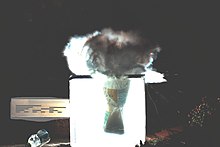Dry ice bomb

A dry ice bomb is a simple explosive device consisting of dry ice and water in a sealed container.
Overview
[edit]Dry ice bombs are commonly made from a container such as a plastic bottle, water and dry ice. The bottle is partly filled with water. Chunks of dry ice are added and the container is closed tightly. As the solid carbon dioxide warms, it sublimates to gas and the pressure in the bottle increases. Bombs typically rupture within 30 seconds to half an hour, dependent largely on the temperature of the air outside the bottle.[1] A dry ice bomb may develop frost on its exterior prior to explosion.[1] After explosion, it appears to have shattered, with the overall shape of the device intact.[1]
Dangers
[edit]Dry ice bombs can explode within seconds due to the rapid sublimation of dry ice, injuring the handler. The abrupt release of high-pressure gas creates a loud noise, which can cause hearing damage even at substantial distances. Fragments thrown at high speeds can cut or puncture. Bombs that fail to go off cannot be safely approached, as they can spontaneously explode.
Dry ice bombs can also be unintentionally made, especially if dry ice is left in an airtight container for extended periods of time.[2]
Injuries caused by dry ice bombs are common, with glass bottles in particular posing risks of serious injury or death.[3][4][5][6] In one case, the explosive release of carbon dioxide gas ruptured the esophagus of a child, requiring emergency surgery.[7]
Legality
[edit]The examples and perspective in this article deal primarily with the United States and do not represent a worldwide view of the subject. (May 2012) |
Dry ice bombs are illegal in many jurisdictions.[8][9] Manufacturing one or using one can lead to imprisonment.[10]
- A law in California that defines "destructive device" includes a list of "weapons" including "[any] sealed device containing dry ice (CO2) or other chemically reactive substances assembled for the purpose of causing an explosion by a chemical reaction".[11][12]
- In Nebraska[13] and other States the noise generated may violate local laws.
- Arizona prohibits dry ice bombs if there is an intent to cause injury, death, or damage to the property of another,[14] as well as their possession by "prohibited possessors" such as convicted felons and illegal immigrants.[15]
- In Utah, simple possession of a dry ice bomb or similar pressurized chemical reaction bomb is a second-degree felony.[16]
- In Colorado, the creation of a dry ice bomb is considered illegal due to interpretation as "possession of an explosive device" [citation needed]
- Leaving an unexploded dry ice bomb can be construed as public endangerment.
- Exploding a dry ice bomb in public in Pennsylvania can result in criminal charges if it is not done on a bomb range, gun range or open area.
See also
[edit]- Spud gun
- Diet Coke and Mentos eruption
- Chlorine bomb
- Rapid phase transition
- Liquid nitrogen cocktail
References
[edit]- ^ a b c Jill Meryl Levy (2006). The First Responder's Field Guide to Hazmat and Terrorism Emergency Response. Firebelle Productions. pp. 8–10. ISBN 9780965151696.
- ^ Sharp, S; Cummins, D; Halloran, S; Donaldson, M; Turnbull, L (17 February 2001). "Explosions may occur if dry ice is placed in airtight transport containers". BMJ (Clinical Research Ed.). 322 (7283): 434. PMC 1119651. PMID 11179178.
- ^ "Boy, 7, receives facial wounds after 'dry-ice bomb' explosion". Press-Telegram. Long Beach. 10 August 1994.
- ^ "Dry ice bomb severely hurts 12-year-old boy". Press-Telegram. Long Beach. 28 May 1995.
- ^ Gorrin, Neal R.; Moore, Thomas C.; Asch, Morris J. (March 1990). "Glass shrapnel injuries to children resulting from "dry ice bomb" explosions: A report of three cases". Journal of Pediatric Surgery. 25 (3): 296. doi:10.1016/0022-3468(90)90069-l. PMID 2313496.
- ^ Langford, Nigel J. (1 December 2005). "Carbon Dioxide Poisoning". Toxicological Reviews. 24 (4): 229–235. doi:10.2165/00139709-200524040-00003. PMID 16499405. S2CID 22508841.
- ^ Pieretti, Rafael V.; Vivas, Pedro (October 1, 1992). "Esophageal injury from a plastic bottle containing dry ice". Pediatric Surgery International. 7 (6): 459–460. doi:10.1007/BF00178829 – via Springer Link.
- ^ "Charlotte: Search Results". 2006-10-24.
- ^ "> News > North County — Neighbors' long quarrel erupted". SignOnSanDiego.com. 2002-09-05. Retrieved 2009-09-20.
- ^ "Dry-ice bomb prank ends in jail". The Press. May 2, 2008. Archived from the original on September 24, 2015. Retrieved September 29, 2011.
- ^ although dry-ice bombs rely upon the principle of phase-change, not chemical reaction
- ^ "CA Codes (pen:12301-12316)". Leginfo.ca.gov. Archived from the original on 2009-05-13. Retrieved 2009-09-20.
- ^ "State of Nebraska" (PDF). Archived from the original (PDF) on 2010-05-27. Retrieved 2009-09-20.
- ^ "13-3102 – Misconduct involving weapons". Azleg.state.az.us. Retrieved 2009-11-10.
- ^ "13-3101 – Definitions". Azleg.state.az.us. Retrieved 2009-09-20.
- ^ "Bomb squad demonstrates dangers of homemade explosives", KSL.com.
